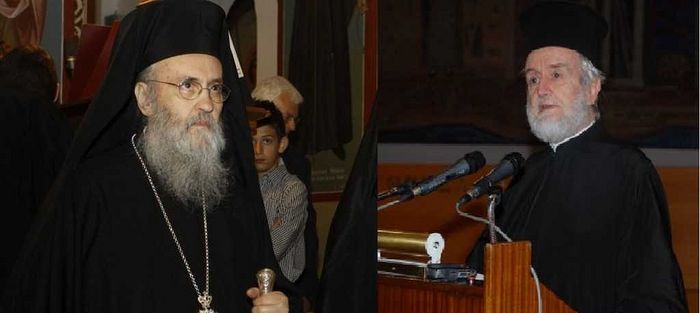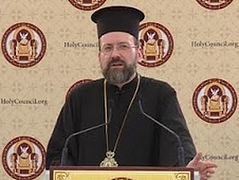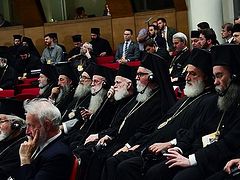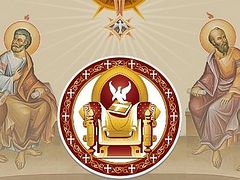June 22, 2016
Greek ecclesial news agency Romfea issued an article yesterday, June 21, correcting previous reports concerning the discussing and passing of the council document “The Mission of the Orthodox Church in Today’s World.”
Whereas it had been previously reported, referencing Metropolitan Ignatius of Demetrias and Almyros,that the document passed with but minor alterations, with the proposed amendments of the Church of Greece’s Met. Hierotheos being rejected, a statement from the Church of Greece notes that, rather, two of the three amendments were approved, with the third remaining open for later discussion, although it remains unclear as to what this means.
The Church of Greece was the sole voice calling for amendments.
During a pointed debate between Constantinople’s Met. John (Zizioulas) of Pergamon and Met. Hierotheos (Vlachos) of Nafpatkos concerning the theology of “person/personhood,” Patriarch Theodoros of Alexandria called for a return to more “practical” matters.
The first amendment concerned paragraph 3 of the section “The Dignity of the Human Person,” which states, “The Orthodox Churches are called upon to help in religious dialogue and co-operation,” to which the Church of Greece proposed to add the following words: “for the sake of peaceful coexistence and the symbiotic social relationships of peoples, without causing any religious syncretism.” This amendment was adopted.
Secondly, in the section “Freedom and Responsibility,” paragraph 1, the Church of Greece proposed amending the phrase: “The highest gift of God to the human person both as a concrete bearer of the image of a personal God and as a member of a community of persons in the unity of the human race by grace reflecting the life and communion of the Divine Persons in the Holy Trinity, is the gift of freedom” to read simply, “The highest gift of God to man is his freedom.” This amendment also passed.
The third amendment concerned the disagreement over the theology of person, with the Church of Greece proposing that phrases concerning the “value of the human person” be replaced with “the value of man.” Met. Hierotheos’ theological arguments on this point have been previously elucidated.
On this point it was resolved to keep the text as is, with the question remaining open.





